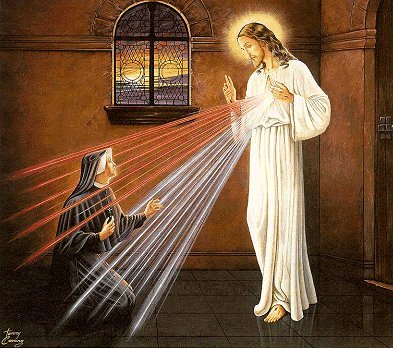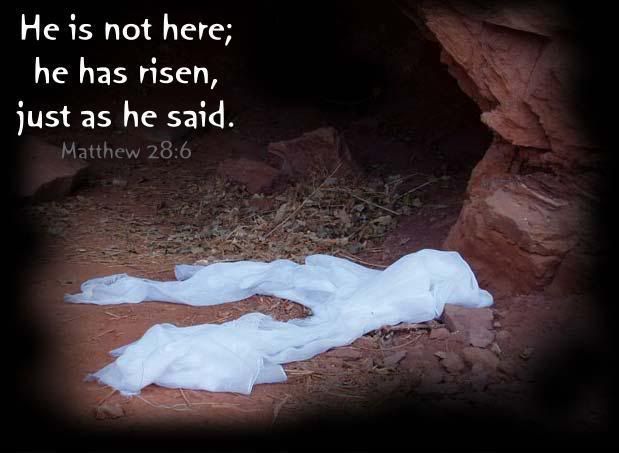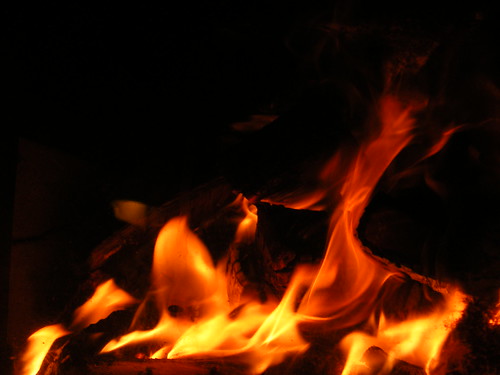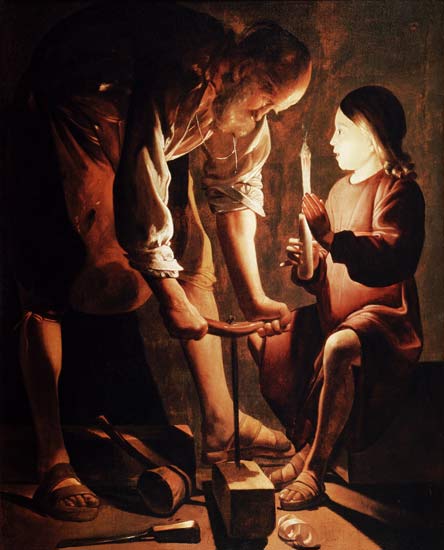 Happy Easter! (or Pascha, the Greek term used in the Eastern Church and one that I like because it gives anti-Catholics one less thing to be misinformed about). This is the day that the Christian world celebrates the Resurrection of the crucified Lord from the dead. But what does it mean for each of us personally?
Happy Easter! (or Pascha, the Greek term used in the Eastern Church and one that I like because it gives anti-Catholics one less thing to be misinformed about). This is the day that the Christian world celebrates the Resurrection of the crucified Lord from the dead. But what does it mean for each of us personally?From the Catechism of the Catholic Church:
"I BELIEVE IN THE RESURRECTION OF THE BODY"
988 The Christian Creed - the profession of our faith in God, the Father, the Son, and the Holy Spirit, and in God's creative, saving, and sanctifying action - culminates in the proclamation of the resurrection of the dead on the last day and in life everlasting.
989 We firmly believe, and hence we hope that, just as Christ is truly risen from the dead and lives for ever, so after death the righteous will live for ever with the risen Christ and he will raise them up on the last day (Cf. Jn 6:39-40). Our resurrection, like his own, will be the work of the Most Holy Trinity:
If the Spirit of him who raised Jesus from the dead dwells in you, he who raised Christ Jesus from the dead will give life to your mortal bodies also through his Spirit who dwells in you. (Rom 8:11; cf. 1 Thess 4:14; 1 Cor 6:14; 2 Cor 4:14; Phil 3:10-11)
990 The term "flesh" refers to man in his state of weakness and mortality (Cf. Gen 6:3; Ps 56:5; Isa 40:6). The "resurrection of the flesh" (the literal formulation of the Apostles' Creed) means not only that the immortal soul will live on after death, but that even our "mortal body" will come to life again (Rom 8:11).
991 Belief in the resurrection of the dead has been an essential element of the Christian faith from its beginnings. "The confidence of Christians is the resurrection of the dead; believing this we live." (Tertullian, De res. 1,1:PL 2,841)
How can some of you say that there is no resurrection of the dead? But if there is no resurrection of the dead, then Christ has not been raised; if Christ has not been raised, then our preaching is in vain and your faith is in vain. . . . But in fact Christ has been raised from the dead, the first fruits of those who have fallen asleep (1 Cor 15:12-14).
I. CHRIST'S RESURRECTION AND OURS
The progressive revelation of the Resurrection
992 God revealed the resurrection of the dead to his people progressively. Hope in the bodily resurrection of the dead established itself as a consequence intrinsic to faith in God as creator of the whole man, soul and body. The creator of heaven and earth is also the one who faithfully maintains his covenant with Abraham and his posterity. It was in this double perspective that faith in the resurrection came to be expressed. In their trials, the Maccabean martyrs confessed:
The King of the universe will raise us up to an everlasting renewal of life, because we have died for his laws (2 Macc 7:9). One cannot but choose to die at the hands of men and to cherish the hope that God gives of being raised again by him (2 Macc 7:14; cf. 7:29; Dan 12:1-13).
993 The Pharisees and many of the Lord's contemporaries hoped for the resurrection. Jesus teaches it firmly. To the Sadducees who deny it he answers, "Is not this why you are wrong, that you know neither the scriptures nor the power of God?" (Mk 12:24; cf. Jn 11:24; Acts 23:6) Faith in the resurrection rests on faith in God who "is not God of the dead, but of the living." (Mk 12:27)
994 But there is more. Jesus links faith in the resurrection to his own person: "I am the Resurrection and the life." (Jn 11:25) It is Jesus himself who on the last day will raise up those who have believed in him, who have eaten his body and drunk his blood (Cf. Jn 5:24-25; 6:40,54). Already now in this present life he gives a sign and pledge of this by restoring some of the dead to life (Cf. Mk 5:21-42; Lk 7:11-17; Jn 11), announcing thereby his own Resurrection, though it was to be of another order. He speaks of this unique event as the "sign of Jonah," (Mt 12:39) the sign of the temple: he announces that he will be put to death but rise thereafter on the third day (Cf. Mk 10:34; Jn 2:19-22).
995 To be a witness to Christ is to be a "witness to his Resurrection," to "[have eaten and drunk] with him after he rose from the dead." (Acts 1:22; 10:41; cf. 4:33) Encounters with the risen Christ characterize the Christian hope of resurrection. We shall rise like Christ, with him, and through him.
When the Lord had clothed himself with humanity, and had suffered for the sake of the sufferer, and had been bound for the sake of the imprisoned, and had been judged for the sake of the condemned, and buried for the sake of the one who was buried, he rose from the dead, and cried aloud with this voice: "Who is the one who contends with me? Let him stand in opposition to me. I have set the condemned man free; I have given the dead man life; I have raised up the one who had been entombed. Who is my opponent? ‘I', he says, ‘am the Christ'. I am the one who destroyed death, and triumphed over the enemy, and trampled Hades under foot, and bound the strong one, and carried off man to the heights of heaven'. ‘I', he says, ‘am the Christ'.
(from an Easter sermon by Melito of Sardis, 2nd century)








 The Divine Mercy novena, starts today (Good Friday) and ends next Sunday, which was designated Divine Mercy Sunday by the late Pope John Paul II.
The Divine Mercy novena, starts today (Good Friday) and ends next Sunday, which was designated Divine Mercy Sunday by the late Pope John Paul II.












